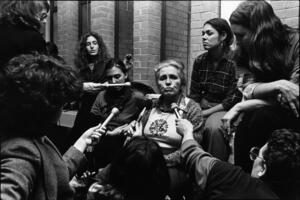Remembering Grace Paley
Activist and writer Grace Paley speaking to reporters.
Photo © Diana Mara Henry/dianamarahenry.com.
Today would have been writer and activist Grace Paley's 87th birthday, and since her death two years ago, it's become a day to celebrate her life and legacy. We've blogged about her several times before, and Annelise Orleck memorialized her so beautifully in our We Remember collection, but she's worth returning to again and again for her deep wisdom about people, relationships, love, and justice, drawn from the small moments of everyday life.
The piece I've been sitting with lately is her essay, "Traveling," which we are using in Living the Legacy, our new curriculum on Jews and social justice. In this essay -- a key text in our lesson plan on moments of personal resistance -- Paley recalls a common theme in stories about civil rights: the experience of being on a segregated bus. First she tells the story of her mother, in 1927, refusing to get up from her seat in the back of the bus and move forward to the white section -- a story she didn't hear until more than 60 years later. She also tells the story of her own bus ride from New York to Miami in 1943, in which she offered her seat to a tired black mother holding a heavy child, and when that offer was refused, she held the woman's child on her lap, provoking a violent statement from another white person on the bus: "Lady, I wouldn't of touched that thing with a meat hook." She writes:
"I thought, Oh, this world will end in ice. I could do nothing but look straight into his eyes. I did not look away from him. Then I held that boy a little tighter, kissed his curly head, pressed him even closer so that he began to squirm. So sleepy, he reshaped himself inside my arms. His mother tried to narrow herself away from that dangerous border, too frightened at first to move at all. After a couple of minutes, she leaned forward a little, placed her hand on the baby's head, and held it there until the next stop. I couldn't look up into her mother face.
"I write this remembrance more than fifty years later. I look back at that mother and child. How young she is. Her hand on his head is quite small, though she tries by spreading her fingers wide to hide him from the white man. But the child I'm holding, his little face as he turns toward me, is the brown face of my own grandson, my daughter's boy, the open mouth of the sleeper, the full lips, the thick little body of a child who runs wildly from one end of the yard to the other, leaps from dangerous heights with certain experienced caution, muscling his body, his mind, for coming realities."
I love the layers and the repetitions of the three generations here: Grace's mother, whose story Grace doesn't even know until she hears it from someone else many years later but whose courage she unconsciously emulates; the young Grace, taking a stand in wordless solidarity with another young woman; and Grace's grandson, who comes to represent both Grace's identification with this young mother and son, and her own (grand)maternal future and its unexpected gifts.
I also love the intersections of politics, family, and storytelling here. No one was better than Grace Paley at making clear the political imperative, as well as the human imperative, to love people and to tell their stories.
So in her memory today, "Let us go forth with fear and courage and rage to save the world."








This is beautiful, Judith. I hadn't heard this story before; thank you for sharing it.
Thank you for this.